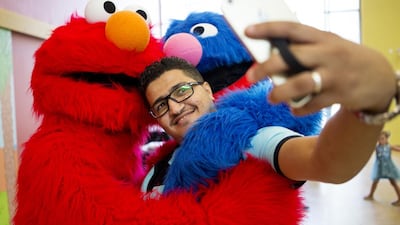Sesame Street has a lot to answer for. In the United States, where it began in 1968, and around the world, the popular television show has taught literacy and numeracy to millions of children. And made it fun.
The format was so successful that it has spawned dozens of international versions – including the newly relaunched Arabic version, Iftah Ya Simsim.
With its clever blend of live action, puppetry and animation, the original show captured children’s imagination in a revolutionary way. In the 1960s, children’s television programmes were hosted by adults who behaved like parents, or slightly eccentric (or even scary) uncles, and if there was any educational content, it was purely didactic. Some of them even simulated the classroom experience, right down to putting their young participants behind school desks.
Sesame Street certainly features adults, but in situational sketches as residents or visitors to the eponymous locality. And they have always been real: so real that when the actor Will Lee, who played Mr Hooper the storekeeper, died, the scriptwriters had his character die on the show as well. A special episode was used to canvass the topic of death in a sensitive way: an important first for children's television.
The street was multiracial, reflecting the broader reality of American society – or, more accurately, an idealised version of it. The residents also included a cast of Muppets who were neither children nor adults, nor even human.
Sesame Street is still going strong in the US, and has become a magnet for celebrities. The supporting cast over the years reads like a who's who of showbiz and beyond: Cab Calloway, James Earl Jones, Johnny Cash, Buzz Aldrin, Robin Williams, Billy Crystal, Jodie Foster, Billy Joel, Diana Ross, Patrick Stewart, Denzel Washington, Celine Dion, James Gandolfini, Ellen DeGeneres, Jim Parsons and Katy Perry are among them. For the stars, being invited on to Sesame Street is a sign that you've got some cred with the kids.
The show has also created its own superstars: Ernie and Bert, Grover, the Cookie Monster, Elmo, The Count and Big Bird. One of them, Kermit the Frog, even made the leap to prime-time, assembling a whole new cast of Muppets – Miss Piggy, Fozzie Bear, Rowlf and Gonzo – to entertain adults. A revamped version of The Muppet Show will premiere on American network TV this month.
While the Arabic-speaking Muppets had a 25-year hiatus, I have no doubt that the likes of Shams, Gargour, Anic and Bader will soon become firm favourites with the latest generation of children in this region.
If nothing else, Sesame Street has been a formidable cultural force. But the show has also had its critics.
One of the main complaints when it first aired was that it shortened children’s attention spans. With some segments only seconds long, and none of them more than a few minutes, it created false expectations for preschoolers.
When children got to a real classroom, they discovered it was no fun at all. Education in America, and around the world, in the 1960s and 70s, involved a lot of sitting up straight and listening to the same teacher drone on and on for hours about very boring things. No quick cut to a cartoon or a silly sketch like on TV, just more of the same, with a play break twice a day.
The good news for our children is that schools are catching up by incorporating play into the curriculum. Many studies have discovered that laughter is a valuable aid to learning, and classrooms are certainly not the sterile, fun-free zones they were when I grew up.
A particular concern in this region is the decline in the use of Arabic among some children. The reasons for this are many, but they include the fact that English is perceived as the language of popular culture. Recent workshops for teachers conducted by the Knowledge and Human Development Authority in Dubai stressed the importance of making Arabic learning fun for children.
Shows such as Iftah Ya Simsim can play an important role in that – as can video games, social media apps and good old-fashioned books.
Learning is a serious business that is vital to this country's future, but there’s no reason why we can’t make it enjoyable too.
bdebritz@thenational.ae
On Twitter: @debritz

